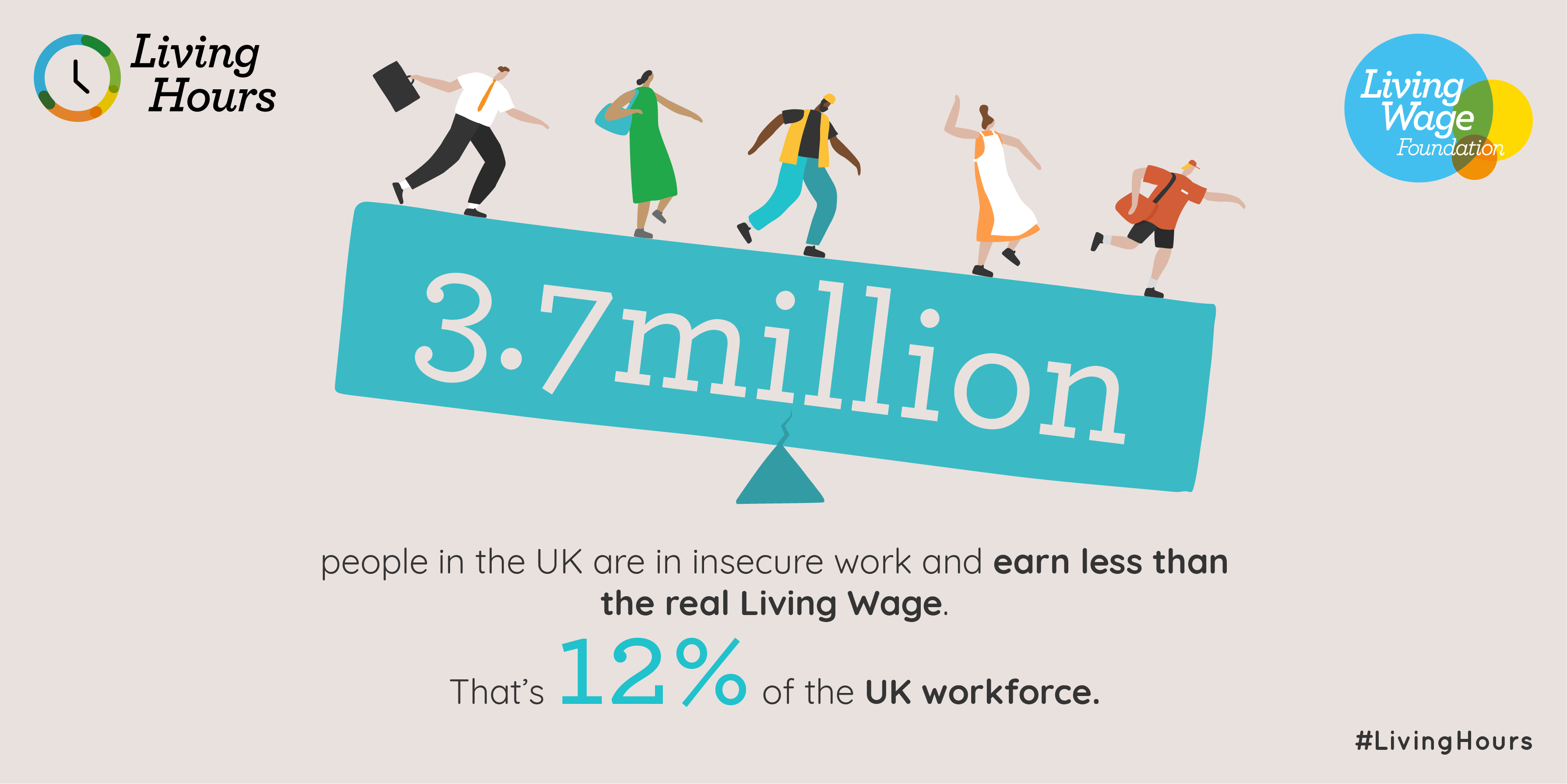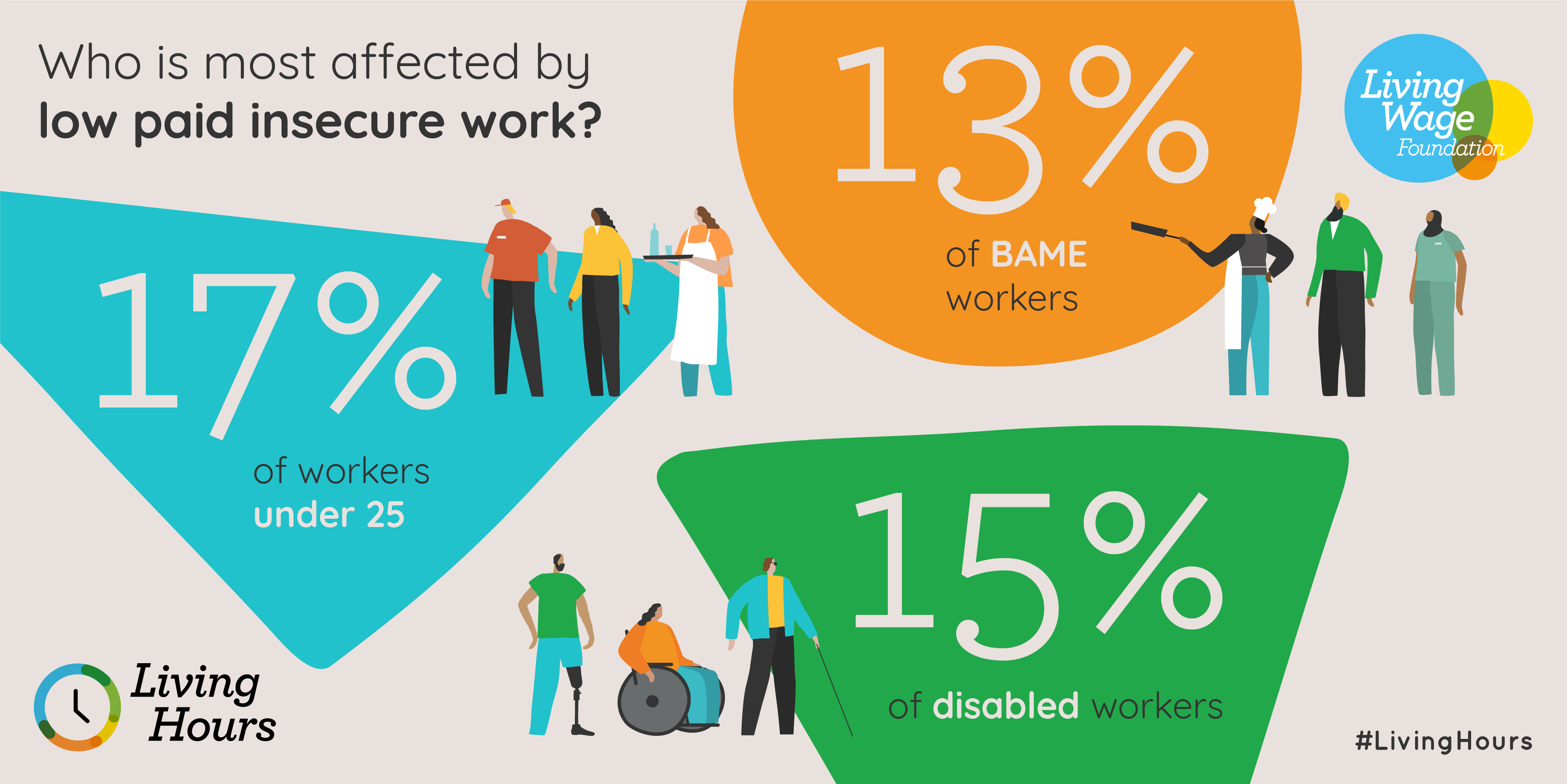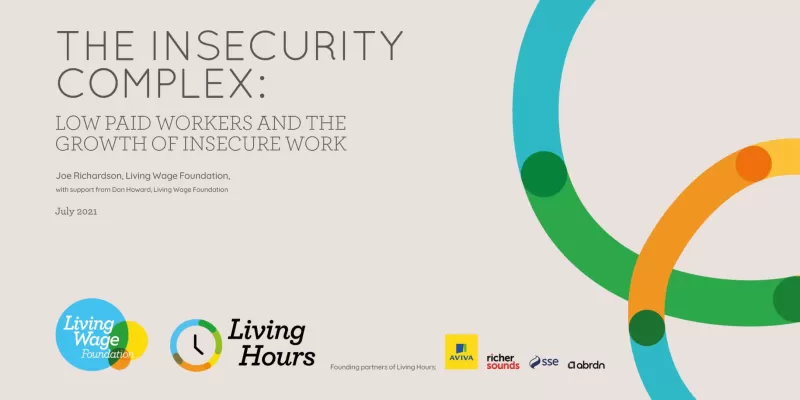Living Wage Foundation releases new report on unstable and volatile working in labour market
There are 3.7 million people (12%) in the UK in low paid and insecure work, and these insecure workers are more likely to have lost work during the pandemic, according to new research conducted by the Living Wage Foundation (LWF). LWF analysis of the Labour Force Survey (LFS) and Family Resource Survey (FRS) found:
-
Around 3.7m people are in insecure forms of work and earn less than the real Living Wage of £10.85 per hour in London, and £9.50 outside of London.
-
Low-paid insecure workers are at a greater risk of losing work due to Covid-19. 46% of insecure, low-paid workers were away from work (mainly due to being furloughed) during the height of the pandemic, compared to 17% of non-insecure workers earning above the Living Wage.

The research found that around 3.7 million workers are in low-paid work and experience some form of work insecurity, defined as those who are underemployed, report volatile pay or hours, are in non-permanent work (where this isn't their choice), or are in low-paid self-employment (those who met more than one of these measures were not double counted).
While the LFS and FRS collect data on the broad presence of insecure work, neither collect specific, detailed data on important measures of work insecurity, such as short shift notice periods and last-minute cancellations of shifts.
To fill this gap the LWF commissioned Survation to run a Separate poll of 2,021 employees. The polling further highlights how unpredictable working hours are for many, and the significant impact of insecure work on family life, health and the ability of workers to plan their lives. Polling found that of those paid below the real Living Wage:
-
12% receive less than 24 hours' notice for their working hours, shifts or work schedules.
-
49% receive less than a weeks' notice of their working hours, shifts or work schedules.
-
68% receive less than four weeks' notice for working hours, shifts or work schedules
-
Almost half (42%) have experienced unexpected cancellations of shifts, and of those, 28% receive no payment and 90% get shifts cancelled without full pay
-
40% said short notice periods had negatively impacted their ability to plan their work and personal lives
-
Over a third (35%) said that short notice periods for shifts had a negative impact on their household finances
-
A quarter (25%) said they had to pay higher travel costs due to short notice for working hours, shifts or work schedules, and 23% had done the same with childcare costs
Despite the overall scale of insecure, low-paid work, significant differences were also found based on ethnicity, age and the sector people work within.

A quarter (25%) of Bangladeshi workers experience low-paid, insecure work, the same as for Pakistani workers. Meanwhile, 13% of Black workers face low-paid insecure work, and the same is true of 10% of white workers and Indian workers respectively. The level of work insecurity amongst ethnic groups is effectively an inversion of median pay rates, with Chinese and Indian"¯workers having the highest median pay and the lowest levels of work insecurity, while Pakistani and Bangladeshi workers have the lowest median pay with the highest levels of insecurity.
Those aged 70 or above are the most likely to be in low-paid insecure work (35%), with young people (16-19-year-olds) the second most likely (27%). This u-shaped incidence of insecurity across age groups can be partly explained by those younger workers leaving school with fewer qualifications having less bargaining power or employment alternatives. Older workers can find themselves in insecure work for similar reasons, though they are also more likely to choose more flexible working arrangements as they approach retirement.
As shown in Table 1, London has the most low-paid insecure workers in gross terms, but not in percentage terms - the number of low paid insecure workers is therefore down to the greater number of jobs in the capital, rather than a greater risk of insecure work. In contrast, both Wales and North East have the lowest number of insecure workers, but the joint-highest in percentage terms.
| Region | Number of workers in low paid and insecure work | Percentage of workers in low paid insecure work | ||
|---|---|---|---|---|
| UK | 3,748,952 | 12% | ||
| London | 567,100 | 12% | ||
| South East | 475,737 | 11% | ||
| East of England | 401,094 | 14% | ||
| North West | 397,147 | 11% | ||
| South West | 369,297 | 14% | ||
| West Midlands | 292,627 | 12% | ||
| Scotland | 282,854 | 11% | ||
| Yorkshire and Humberside | 256,315 | 10% | ||
| East Midlands | 246,864 | 11% | ||
| Wales | 201,225 | 14% | ||
| North East | 156,970 | 14% | ||
| Northern Ireland | 101,724 | 12% |
As shown in Table 2, the five worst impacted sectors (‘Wholesale’, ‘Health and social work’, ‘Construction’, ‘Accommodation and food’ and ‘Transport’) account for more than half (54%) of the low paid insecure worker population in the UK. However, the Agricultural industry has by far the most low paid insecure workers in percentage terms (47%).
| Sector | Number of low paid insecure workers | Percentage of workers in low paid insecure work | ||
|---|---|---|---|---|
| Wholesale, retail, repair of vehicles | 524,438 | 14% | ||
| Health and social work | 419,023 | 10% | ||
| Construction | 416,306 | 19% | ||
| Accommodation and food services | 338,808 | 22% | ||
| Transport and storage | 284,109 | 18% | ||
| Education | 280,820 | 8% | ||
| Admin and support services | 269,425 | 19% | ||
| Other service activities | 210,107 | 24% | ||
| Prof, scientific, technical | 203,842 | 8% | ||
| Manufacturing | 197,040 | 7% | ||
| Arts, entertainment and recreation | 182,049 | 22% | ||
| Agriculture, forestry and fishing | 152,277 | 47% | ||
| Information and communication | 101,855 | 7% | ||
| Public admin and defence | 40,820 | 2% | ||
| Financial and insurance activities | 36,820 | 3% | ||
| Real estate activities | 16,487 | 4% | ||
| Water supply, sewerage, waste | 10,031 | 4% | ||
| Electricity, gas, air cond supply | 5,422 | 3% | ||
| Mining and quarrying | 3,259 | 3% |
Living Hours Graham Griffiths, Director of the Living Wage Foundation, said: “Insecure work has been a consistent feature of the labour market over the past twenty years. The result is millions of people unable to get the hours and the pay they need to meet their everyday needs, with many families throughout the UK struggling to keep their heads above water. Over the past year this problem has been exacerbated, with many low paid workers in insecure jobs also more likely to lose work. There is a real danger that as we look to recover from the huge damage of the pandemic, we fail to recognise the vital need for an economy built on jobs with decent pay and secure hours. This is what we need for a modern, dynamic economy that delivers stability to workers, families and businesses.”
Despite the significant impact of the pandemic on insecure workers, a number of organisations have committed to provide guaranteed secure hours through the Living Wage Foundation’s ‘Living Hours’ programme, including abrdn, Aviva and SSE.
Living Hours is a voluntary standard that requires employers to provide their workforce with stable, secure and predictable hours alongside a real Living Wage. Accredited Living Hours employers are required to provide the following measures for their employees:
-
At least 4 weeks’ notice, with guaranteed payment if shifts are cancelled within this notice period;
-
The right to a contract that reflects accurate hours worked;
-
A guaranteed minimum of 16 hours a week (unless the worker requests fewer).
John Stewart, HR Director, SSE plc, said:
“This research shows just how many lives across the UK are impacted by insecure hours and working conditions. Earning below the Living Wage is hugely challenging for many people, but when this is combined with not getting enough hours or not receiving proper notice for shifts, it’s even harder to weather the storm, particularly during such challenging times. Providing workers with stable, guaranteed hours alongside decent pay is essential not only for workers and families, but it makes sense for businesses too. It encourages longer-term thinking and careful planning, and it ensures a healthy and motivated workforce. That’s why SSE is proud to be a Living Hours employer: it’s the right thing to do for our workers and our business, and we hope our commitment will help show others the way”.
Danny Harmer, Chief People Officer, Aviva, said:
“Businesses need to provide jobs that treat and pay people fairly. We should not underestimate the impact unstable and unpredictable hours have on the individual, and on their families too. Signing up to Living Hours stands for providing financial clarity and certainty. That means happier and healthier colleagues which is good for customers, business and society.”
Meredith Adams, Sustainability Manager - Social Impact, abrdn, said:
“Living Hours is effective and practical. It is an independent standard with a robust methodology which gives our organisation certainty that we are providing our people with well paid, secure employment. It creates a common understanding of these terms and practices and this shared definition is vital to improving the standard of employment across the UK. We also support Living Hours as an investor, as this plays a role in creating stronger and more resilient economies.”.
READ THE REPORT
This report looks at the scale of insecure and low paid work in the UK, the impact of Covid-19 on insecure workers and includes polling which reveals the impact of short notice periods for shifts.
It also looks at how our Living Hours accreditation is part of the solution for employers wanting to support their employees with guaranteed hours and secure working patterns.

